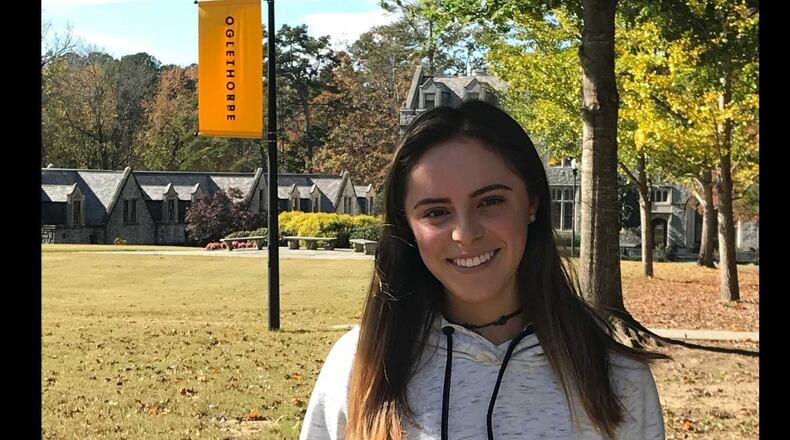Oglethorpe University president Larry Schall is like a college basketball coach when it comes to recruiting students.
He looks for them throughout metro Atlanta and increasingly abroad, in countries such as Dubai and Jordan.
Oglethorpe and many metro Atlanta colleges and universities are seeing a higher percentage of their students come from other nations, and they want more international students, saying their presence improves campus diversity.
The recruitment efforts, though, come as some worry the White House’s proposed travel ban against a handful of countries and President Donald Trump’s desire for a border wall along the Mexican border will discourage some foreign students from coming here. Trump believes the measures are necessary to reduce crime and protect the homeland from foreign terrorists.
Having students from other countries “makes our campus like a model (United Nations), which is what we want,” said Mark Butt, Emory University’s associate dean of admissions.
The number of non-U.S. resident students in the University System of Georgia has increased by nearly 50 percent over the past decade, from 9,896 in 2007 to this fall’s total of 14,834. Nearly one in 10 Clark Atlanta University students are international. Oglethorpe, in Brookhaven, has a student body that is about 8.5 percent international. The university wants to increase that percentage to 15 to 20 percent in a few years.
Schall recently returned from a recruiting trip to the Middle East and Asia. In Vietnam, Schall met prospective students’ parents who once were part of the Viet Cong.
“That next generation has no animosity toward the United States,” Schall said.
The number of new international students enrolled at an American college or university declined by about 10,000 students in 2016, a 3 percent decline from the prior year, according to a report released earlier this month by the Institute for International Education and the U.S. State Department Bureau of Educational and Cultural Affairs. It’s the first decline in 12 years, officials said.
While some have blamed the decline on Trump, others cite factors such as a reduction in government scholarships by Brazil and Saudi Arabia.
Butt said they’ll have a better idea if there is a dip in international students in the spring once the admissions process is complete. Emory’s non-U.S. citizen student enrollment has nearly doubled between 2008 and this fall, from 1,436 to 2,617.
“It’s something we are going to keep an eye on,” he said.
Most international students here major in pre-med, engineering and math.
Oglethorpe freshman Angelica Sanchez, born and raised in Mexico, said some classmates in her homeland asked her why she wanted to study in the United States. Friends shared rumors that the federal government was checking social media accounts of anyone applying for visas.
“I was like ‘Should I go?,’ ” Sanchez said.
Sanchez really wanted to attend college in the U.S., preferably the South.
Atlanta intrigued her. The bright lights of the city skyline were “pretty,” she said. Sanchez’s father said there were many opportunities to succeed in America.
Sanchez, who turned 19 this month, is on the golf team, and the rhythms of life as a student-athlete from another country were initially stressful. She’s adjusted, with the help of campus services and teammates.
“It’s fun,” Sanchez said of life at Oglethorpe.
Oglethorpe has transitional services for international students and resources to help them learn English. Clark Atlanta has two prayer rooms for Muslim students. Emory University offers them advice on getting a driver’s license, medical insurance and free English classes. Sanchez has used some campus services to improve her essays.
Emory, just six miles from Oglethorpe, holds about 100 recruiting events each year, with some in Africa, Europe and the Middle East. Last year, students from more than 100 nations applied to attend Emory, Butt said.
He, Schall and others say Atlanta is a draw because of its research institutions, international brands like Coca-Cola and its reputation as an inclusive community because of the civil rights movement and the 1996 Summer Olympics.
Among Georgia’s public colleges and universities, Georgia Tech has the largest number of international students. Its international student enrollment doubled since 2006, from 2,907 to 5,959 in 2016. The largest percentage of Tech’s international students come from China and India. Emory gets many international students from those countries, as well as South Korea, Brazil and Mexico.
“We usually let the academic talent drive where we go,” Butt said.
—-
International students at UGA, Tech
Georgia Tech and the University of Georgia have increased their international student bodies significantly in recent years. Here’s the breakdown:
School 2006 2016 Pct. Increase
Georgia Tech 2,907 5,959 105%
UGA 2,159 2,718 26%
Sources: Georgia Tech, University of Georgia
About the Author
Keep Reading
The Latest
Featured



